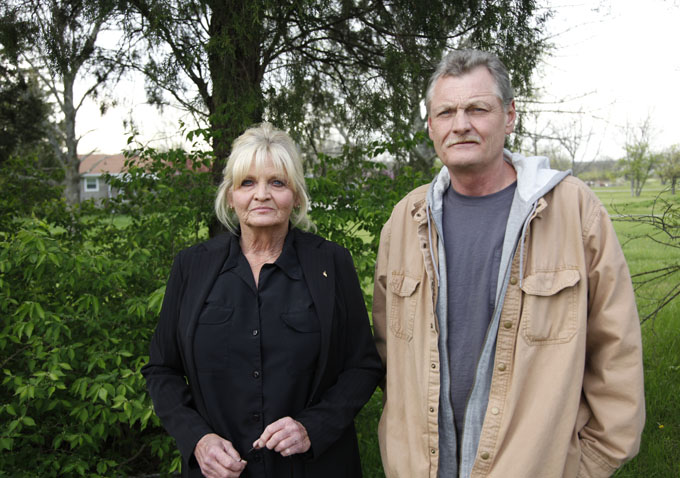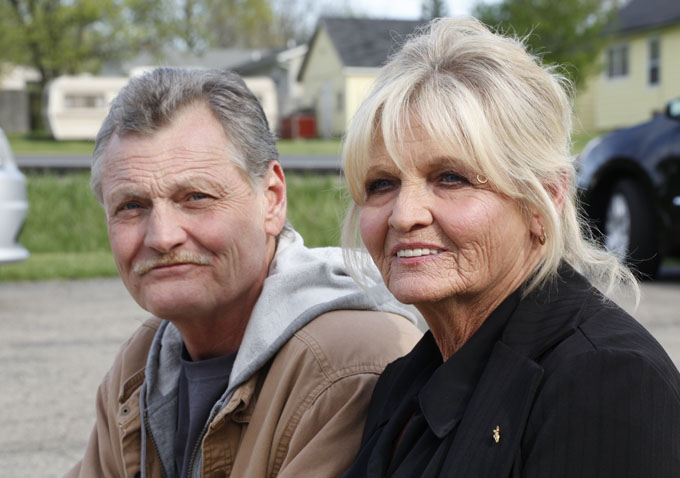 Few court cases captured the public imagination in recent memory quite like the O.J. Simpson trial. An American football hero, part-time movie star and color commentator, a whole different side to his public persona came through when he was charged with murdering his ex-wife. And when the not guilty verdict reverberated throughout the nation, it hardly put an end to the story. Some folks said it was an example of the justice system’s failings, others pointed the finger to the ineffectual prosecution, while others declared that Simpson was innocent all along. And now the waters get muddier with "My Brother the Serial Killer," which is arriving on screens and heated up by the news that its titular subject is linked to the slaying of Nicole Brown Simpson. Does it let O.J. off the hook? Not exactly, but it also doesn’t make much sense either.
Few court cases captured the public imagination in recent memory quite like the O.J. Simpson trial. An American football hero, part-time movie star and color commentator, a whole different side to his public persona came through when he was charged with murdering his ex-wife. And when the not guilty verdict reverberated throughout the nation, it hardly put an end to the story. Some folks said it was an example of the justice system’s failings, others pointed the finger to the ineffectual prosecution, while others declared that Simpson was innocent all along. And now the waters get muddier with "My Brother the Serial Killer," which is arriving on screens and heated up by the news that its titular subject is linked to the slaying of Nicole Brown Simpson. Does it let O.J. off the hook? Not exactly, but it also doesn’t make much sense either.
Directed by David Monaghan (who previously showed interested in the topic with the doc "Murder Hotel: The Story of America’s First Serial Killer"), the film details the story of Glen Rogers, a man now sitting on death row, who has been convicted of five murders, is suspected of dozens more, and claims himself to have killed more than 70 times. Rather than talk with the authorities who investigated his various cases, experts in the field or really, anyone who could look at the story with a certain distance, ‘My Brother’ is told through the eyes of his older brother, Clay Rogers. And it’s a fundamental mistake by Monaghan because the film gets lost in an odd balancing act of trying to remain objective, while Clay essentially offers up any number of reasons as to why his brother turned out the way he did, in a bid for a bit of sympathy for a man who ruthlessly butchered (mostly) women. So what are those explanations?
 Clay has no shortage of answers: Glen was the next child born after his parents tried to get his mother’s tubes tied (a judge wouldn’t allow it as her health was in danger); a tarot card reading promised a dark future (seriously); he was physically abused by his father; he was sexually abused while in juvenile detention; his mother rejected him; and he didn’t have the right tattoos in order to ward off evil spirits or bad thoughts (again, seriously). There is no doubt Glen had a truly awful upbringing, but spending time on why he might have done it, versus what he actually did, sidelines the movie from time to time, particularly as it strains to reach a substantive 90 minutes. But more intriguing is how quasi-complicit Clay and his sister Sue are in allowing Glen’s behaviour to go on as long as it did without calling authorities.
Clay has no shortage of answers: Glen was the next child born after his parents tried to get his mother’s tubes tied (a judge wouldn’t allow it as her health was in danger); a tarot card reading promised a dark future (seriously); he was physically abused by his father; he was sexually abused while in juvenile detention; his mother rejected him; and he didn’t have the right tattoos in order to ward off evil spirits or bad thoughts (again, seriously). There is no doubt Glen had a truly awful upbringing, but spending time on why he might have done it, versus what he actually did, sidelines the movie from time to time, particularly as it strains to reach a substantive 90 minutes. But more intriguing is how quasi-complicit Clay and his sister Sue are in allowing Glen’s behaviour to go on as long as it did without calling authorities.
At one point during ‘My Brother,’ Clay shares an anecdote about the time he and Glen were hitting the road on a mini-crime spree, and one night, he arrives at their motel to find their room in shambles, his brother covered in blood. Does he call the cops? Nope. Even after Glen boasts of having killed before, Clay just orders him to clean up and they get out of there. Another time, Glen tells Clay he has a body in his car. Even later, Glen calls Sue to tell her he’s just killed two women. On none of these occassions do the siblings either call the cops, vaguely offering up some kind of moral quandary about turning in their brother. Really? We understand that the bond between siblings is strong, particularly in Southern families, but the line can be drawn at multiple murders right?
 In any event, when Clay later reveals that Glen called him out of the blue from California to boast he was partying with Nicole Simpson and that he was planning on her "taking her down," once again he stays silent. Clay continued to stay quiet all through the subsequent trial of O.J. However, a prisoner letter from an inmate to California prosecutors, claiming that Glen that confessed the murder to him prompted the wheels to start turning. And? Well, the theory goes like this: Simpson hired Glen to rob his ex-wife Nicole of some expensive earrings and half-seriously or seriously added, "You may have to kill the bitch." So, Glen went to commit the robbery, arriving in a white Ford Bronco (a witness noticed a vehicle of that description), was interrupted by the arrival of Nicole and Ron Goldman, killed them both and took off. Moreover, a second footprint was found at the scene, one that didn’t belong to O.J. Simpson. And, the method of killing seemed conistent with Glen’s usual modus operandi. But there are enough holes to drive a truck through.
In any event, when Clay later reveals that Glen called him out of the blue from California to boast he was partying with Nicole Simpson and that he was planning on her "taking her down," once again he stays silent. Clay continued to stay quiet all through the subsequent trial of O.J. However, a prisoner letter from an inmate to California prosecutors, claiming that Glen that confessed the murder to him prompted the wheels to start turning. And? Well, the theory goes like this: Simpson hired Glen to rob his ex-wife Nicole of some expensive earrings and half-seriously or seriously added, "You may have to kill the bitch." So, Glen went to commit the robbery, arriving in a white Ford Bronco (a witness noticed a vehicle of that description), was interrupted by the arrival of Nicole and Ron Goldman, killed them both and took off. Moreover, a second footprint was found at the scene, one that didn’t belong to O.J. Simpson. And, the method of killing seemed conistent with Glen’s usual modus operandi. But there are enough holes to drive a truck through.
First off, it’s presented during ‘My Brother’ that Glen’s focus on killing mostly women largely had to do with his own bitter feelings toward his mother, for not protecting him from the abuse of his father as a child. It’s noted that the women he often took up with looked like his mother (Nicole doesn’t) and one expert speculates he was essentially killing his mother over and over again. Second, it’s quickly established that Glen was savvy enough to know how to dispose of bodies, cross state lines and manipulate the system to stay out of trouble. Everything about the Brown/Goldman slaying — it takes place out doors, it was somewhat premeditated — doesn’t seem to fit the profile of Glen, who usually had some kind of relationship with his victims (rather than just a passing aquaintance), with the slayings usually fueled by a sense of betrayal. Moreover, the theory presumes that O.J. was someone who knew Glen well enough that he could entrust him with this robbery scheme, when there’s nothing to really put them together at all aside from the fact Glen did some work in his house once. In fact, one prosecutor suggests it was actually Faye Resnick who knew Glen more closely, not Nicole. And that’s not to mention there is zero forensic evidence putting Glen at the scene.
 But wrapped up in the veneer of sensationalized, tabloid crime reporting, we suppose it’s the tawdriness factor that makes ‘My Brother’ compelling, but it politely ignores real avenues of discussion to keep the central theory standing. No one seems to want to acknowledge the fact that Glen (and sociopaths in general) likes to boast, that his claim of 70 kills could be a tall tale meant to impress or intimidate, and even his comments about hanging out with Nicole Simpson could have been a stretch to the truth. And again, Monaghan doesn’t push Clay hard enough to question his own involvement and failings to stop his brother sooner, even after it becomes clear he’s somewhat aware of what his sibling is doing. But perhaps most galling is that the director allows the superstitious Clay a woe-is-me moment, as he sobs that had things been different, he might have been killing alongside his brother. But where are the tears for the victims and their families?
But wrapped up in the veneer of sensationalized, tabloid crime reporting, we suppose it’s the tawdriness factor that makes ‘My Brother’ compelling, but it politely ignores real avenues of discussion to keep the central theory standing. No one seems to want to acknowledge the fact that Glen (and sociopaths in general) likes to boast, that his claim of 70 kills could be a tall tale meant to impress or intimidate, and even his comments about hanging out with Nicole Simpson could have been a stretch to the truth. And again, Monaghan doesn’t push Clay hard enough to question his own involvement and failings to stop his brother sooner, even after it becomes clear he’s somewhat aware of what his sibling is doing. But perhaps most galling is that the director allows the superstitious Clay a woe-is-me moment, as he sobs that had things been different, he might have been killing alongside his brother. But where are the tears for the victims and their families?
There is no doubt that Glen Rogers is an evil person who has done some horrific things. And maybe he found his way into the orbit of Nicole and O.J. Simpson. But the casual stitching together of largely circumstantial evidence in order to propose a not-quite-halfway-plausible alternate theory to the killings never really comes together. Had Monaghan chosen to truly investigate these claims, putting the family narrative aside, he might have found a way to present this proposal in a clear headed way that asked serious questions about how the entire case was handled. But ‘My Brother’ isn’t that movie. Instead it seems happy enough to play in the sandbox of possibility, coupled with the high of being attached to a celebrity crime story, without ever really taking seriously what effect the posits it throws around has on the victims, their families or the accused. [C-]
"My Brother the Serial Killer" airs tonight at 9 p.m. on Investigation Discovery.

